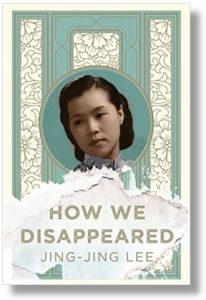Book Bites: Jing-Jing Lee’s “How We Disappeared”
Described by Xinran as a “brilliant, heart-breaking story”, this is indeed a well-crafted, harrowing tale that interweaves a modern narrative with the war years. The two main protagonists – one a subject and one very much an object of history – tell parallel stories that knit together at the end in a conclusion of Dickensian harmony and hope. A fitting and suitably uncomfortable denouement.
The main story is of Chinese-origin Wang Di, a child in a rural Singapore at the time of the Japanese occupation of the early 1940s. Having believed – like the British themselves – that the “superior” colonial power would rout the Japanese, the Japanese surprised everyone and seized the territory in only a few months. It challenged the very nature of the ingrained racial superiority of Empire. The self-evident truth of the dominant white race had been revealed to be bluster.
Winston Churchill described the Fall of Singapore to be “the worst disaster and largest capitulation in British history”. It was a major national humiliation and the impact on the British was dramatized in the BBC series “Tenko”, but little has been written or documented in terms of the real lived experience of the Chinese under Japanese invasion. Because of a lifetime of shame, many families have gone to their graves without speaking of the pain and almost unimaginable suffering they endured at the hands of the occupying forces.
Wang Di is taken by the invading Japanese and forced to into sex slavery as one of the vast numbers of so-called comfort woman (wei an fu). Only recently has this barbarity been admitted and discussed, with at least 200,000 Chinese women – some as young as 14 – abducted over the course of the war. Chinese and Korean women bore the brunt and by the end of the war it is reputed that up to 400,000 women had been enslaved, many taken and dumped in Japanese outposts far from home.
As the story unfolds, we sense the isolation, the violence, the despair as well as the faint glimmers of hope. We previously reviewed Natascha Kampusch’s horrific tale of abduction, “3,096 Days”, but Lee’s story is barely even imaginable. From morning until night, for weeks on end, for three long years Wang Di and her fellow prisoners are raped, beaten and starved. The relentless inhumanity of the story is only relieved by Wang Di’s longing for family reunion: a pervasive hope that goes terribly awry but still feeds the human spirit.
 This is clearly a novel with a political agenda and one that unveils hidden truths, national scandals and destroyed lives. The culture of shame resulted in these women being scorned, blamed and shunned througout their entire lives. On their return, many were disowned by their families for bringing shame on the family name. It is only recently that this deferential Confucian culture of shame – the social insistence that one takes personal responsibility for failure for fear of ostracization – has begun to be eroded.
This is clearly a novel with a political agenda and one that unveils hidden truths, national scandals and destroyed lives. The culture of shame resulted in these women being scorned, blamed and shunned througout their entire lives. On their return, many were disowned by their families for bringing shame on the family name. It is only recently that this deferential Confucian culture of shame – the social insistence that one takes personal responsibility for failure for fear of ostracization – has begun to be eroded.
The book switches from past to present, and its non-linear framework allows the author to introduce a separate family whose schoolboy son gradually uncovers the truth. Although well-handled, and clearly essential in order to bring some much-needed light to the otherwise relentless darkness, it is slightly less convincing. Indeed, this is a very well-written book that only veers into clunky advocacy towards the last few pages. However, it is quite cleverly and engagingly done and certainly deserves to be widely read for its window onto a specific set of social-cultural relations. For Western audience it will lend the reader a stranger-than-fiction insight into a tragic little-known episode in modern history, and an equally useful insight into the non-Western world.







